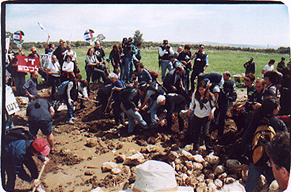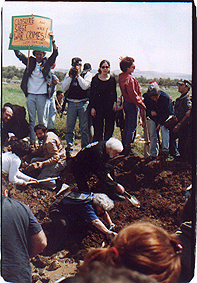I wish I had not just gotten the phone call I just did, and this story would have had a better ending.
As you probably know, the Israeli army has laid siege to many cities, towns, and villages in the occupied territories. One way they do this is by digging trenches across the roads leading in or out, making them unpassable by cars. Where, once, soldiers merely patrolled these exits and granted permission to enter or leave, today the trenches prevent all access by vehicle. This serves no security function whatsoever – it prevents Palestinians from having access to each other, not to Israel – but is a cruel and arbitrary way to assert power and control.
For some time, the Coalition of Women for a Just Peace has been demonstrating to lift this siege (referred to euphemistically as “closure” by Israel). Six weeks ago, we ourselves “laid siege” to the Defense Ministry of Tel Aviv (blocking the entrance with our bodies), and three weeks ago we marched on the military blockade of Bethlehem.
Today’s action was the next level of resistance, and the Coalition of Women worked hand in hand with three other organizations: Rabbis for Human Rights, Gush Shalom, and the Committee Against House Demolitions. The idea was to come to a village under siege and physically fill in the trench, thereby making the road passable. The army was clearly intent on preventing that from happening.
We chose to lift the siege on Rantis, a peaceful town of 3,000. Rantis has no doctor and no employment opportunities; under siege, there is no access to medical care and almost total unemployment. One woman already gave birth at the trench when she was unable to get out for medical attention, and seven students have lost a semester of university studies.
Together we were about 300 activists who set out on buses this morning. Most of us were Israelis, but there was a significant presence of internationals, too, including the undauntable CPT-ers (Christian Peacemakers Team) who work in Hebron. On each bus, one person led a
discussion about the strategy of nonviolent direct action, the importance of not provoking soldiers, and the commitment to breaking the law openly and nonviolently. We talked about rights under arrest and interrogation, and our responsibility for the safety and well-being of each other. On our bus, I shared the words of Gandhi, “Non-cooperation with evil is a sacred duty.”
When we reached the perimeter of the village, we began to march with our shovels and hoes toward the trench, now being blocked by a line of soldiers. But we were many more activists than soldiers, they didn’t open fire, and we easily passed through. As soon as we reached the trench, we swarmed all over, shoveling rocks and dirt into it, trying to fill it up. It seemed an impossible task, as we had so few tools and the trench gouged out the road quite deeply from one side to the other. What’s worse, the ground was very hard, studded with rocks, and it was very difficult to loosen earth for use as fill.
Jerusalem
23 March 2001
Subject: Not Cooperating With Evil
Friends,


And now at home, freshly showered and sitting down to tell you about this small victory, I get a call from Dina, who made friends with one of the villagers. The army returned, the Palestinian had told her, and used their heavy machinery to dig out fresh trenches. We expected that. And now, he said, they also placed large concrete slabs in front of the trenches, which could never be moved by bare hands and grit alone. And the truck that had brought these slabs had driven off the road, deliberately destroying crops in the fields. And one villager had been beaten and his car window smashed.
These are more than just reprisals against the Palestinians. They are a message from the army to us: This will happen everytime you do something like this.
Tomorrow, five of us will go to Rantis to document the new damage and talk to the villagers. We’ll also be thinking about how to continue to subvert the oppression without jeopardizing the Palestinians themselves. It won’t be easy or simple, but, as Israelis, we’ve got to figure out a way to stop cooperating with evil.
Gila Svirsky
Coalition of Women for a Just Peace
Member organizations of the Coalition of Women for a Just Peace:
Bat Shalom; Mothers and Women for Peace (formerly Four Mothers); New Profile: Movement for the Civil-ization of Society in Israel; Neled, TANDI, Women Engendering Peace; Women in Black; and WILPF - Israel chapter.
Our principles:
- An end to the occupation.
- The full involvement of women in negotiations for peace.
- Establishment of the state of Palestine side by side with the state of Israel based on the 1967 borders.
- Recognition of Jerusalem as the shared capital of two states.
- Israel must recognize its responsibility for the results of the 1948 war, and find a just solution to the Palestinian refugee problem.
- Equality, inclusion and justice for Palestinian citizens of Israel.
- Opposition to the militarism that permeates Israeli society.
- Equal rights for women and for all residents of Israel.
- Social and economic justice for Israel’s citizens, and integration in the region.
If you want to help:
Write to President Bush (president@whitehouse.gov), Vice-President Cheney (vice.president@whitehouse.gov), and Colin Powell (secretary@state.gov).
Just say “Tell Israel to end its siege of the Palestinian towns and villages.” Remember – a simple message gets counted and reported the same as an eloquent one.
If you’d like to contribute:
We’d appreciate a donation for the Coalition for future actions – in any of three ways:
- In the U.S., you can make a tax-deductible contribution by writing a check to the New Israel Fund, with a memo “For the Coalition of Women for a Just Peace,” and sending to: New Israel Fund, Department WS, PO Box 91588, Washington, DC 20090-1588.
- Send a check addressed to US/Israel Women-to-Women marked “For the Coalition of Women for a Just Peace,” and mail to US/Israel Women-to-Women, 275 Seventh Avenue - 8th floor, New York, NY 10001.
- Send a check to Bat Shalom “for the Coalition of Women” at Bat Shalom, POB 8083, Jerusalem 91080, Israel.
Thank you!